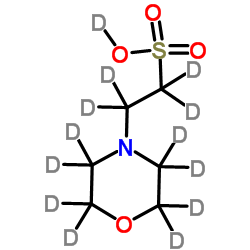MES-13d
Modify Date: 2024-01-19 22:13:56

MES-13d structure
|
Common Name | MES-13d | ||
|---|---|---|---|---|
| CAS Number | 352534-94-2 | Molecular Weight | 208.317 | |
| Density | 1.4±0.1 g/cm3 | Boiling Point | N/A | |
| Molecular Formula | C6D13NO4S | Melting Point | N/A | |
| MSDS | N/A | Flash Point | N/A | |
Use of MES-13dMES-d13 is the deuterium labeled MES[1]. MES (2-Morpholinoethanesulphonic acid) is a buffering agent in biology and biochemistry. MES is one of the Good's buffers, the buffer capacity ranging pH 5.5-7.0. MES is broadly used to regulate pH value for plants culture medium, reagent solution, and physiological experiments[2][3]. |
| Name | 2-(n-morpholino)ethanesulfonic acid-d13 |
|---|---|
| Synonym | More Synonyms |
| Description | MES-d13 is the deuterium labeled MES[1]. MES (2-Morpholinoethanesulphonic acid) is a buffering agent in biology and biochemistry. MES is one of the Good's buffers, the buffer capacity ranging pH 5.5-7.0. MES is broadly used to regulate pH value for plants culture medium, reagent solution, and physiological experiments[2][3]. |
|---|---|
| Related Catalog | |
| In Vitro | Stable heavy isotopes of hydrogen, carbon, and other elements have been incorporated into drug molecules, largely as tracers for quantitation during the drug development process. Deuteration has gained attention because of its potential to affect the pharmacokinetic and metabolic profiles of drugs[1]. |
| References |
[2]. N E Good, et al. Hydrogen ion buffers for biological research. Biochemistry. 1966 Feb;5(2):467-77. |
| Density | 1.4±0.1 g/cm3 |
|---|---|
| Molecular Formula | C6D13NO4S |
| Molecular Weight | 208.317 |
| Exact Mass | 208.138123 |
| PSA | 75.22000 |
| LogP | -2.13 |
| Index of Refraction | 1.517 |
| Safety Phrases | 22-24/25 |
|---|
| 2-[(H)Morpholin-4-yl](H)ethane(H)sulfonic acid |
| 2-[(H)-4-Morpholinyl](H)ethane(H)sulfonic acid |
| Morpholine-2,2,3,3,5,5,6,6-d-4-ethane-α,α,β,β-d-sulfonic acid-d |